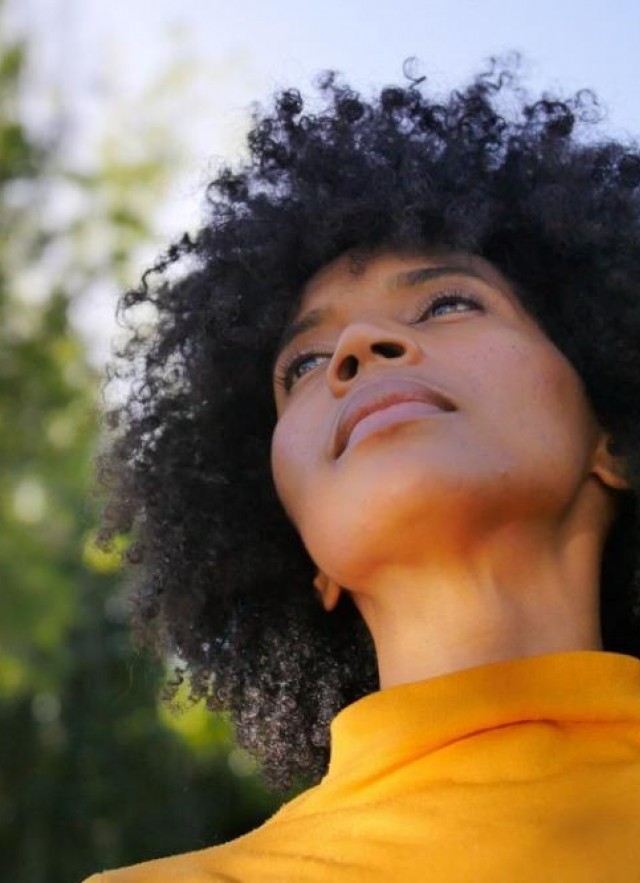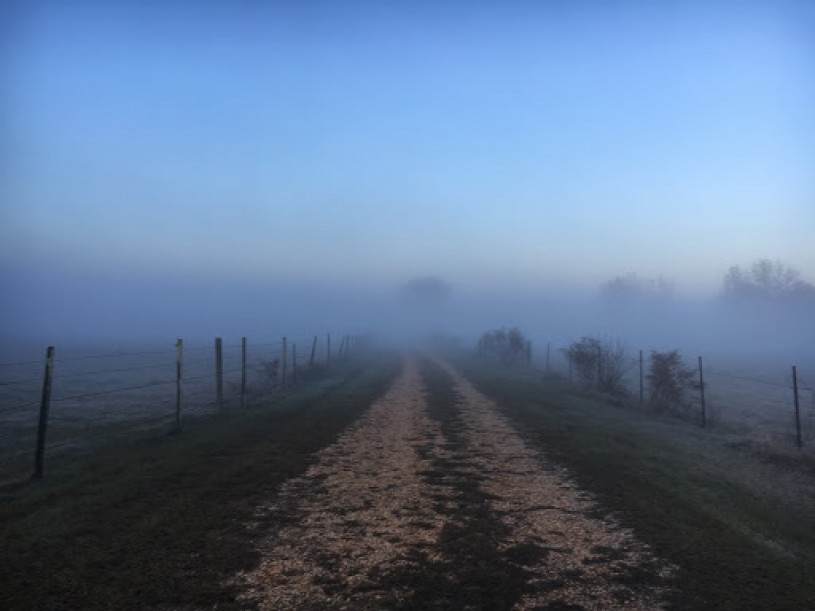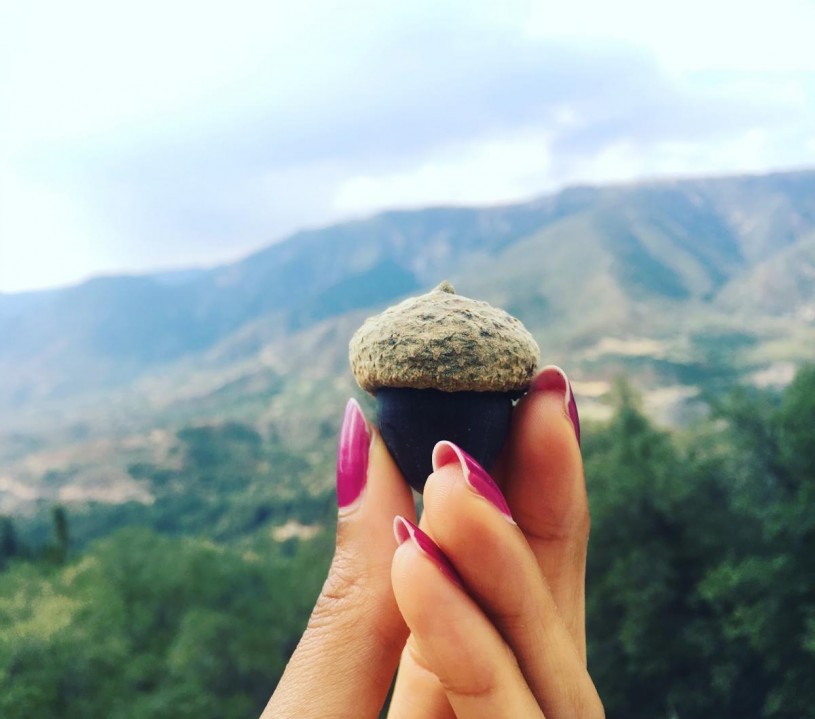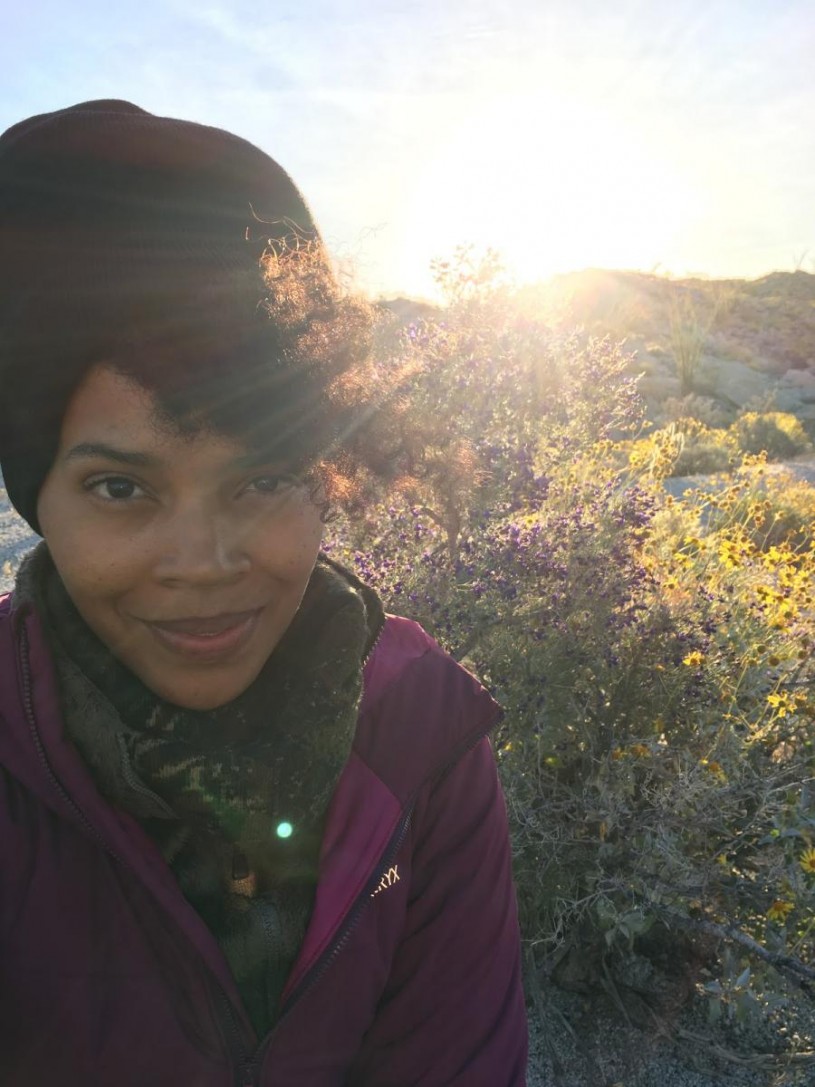BE ADVISED: On Saturday, February 21, the Natural History Museum will be closing at 4 pm. The Los Angeles Memorial Coliseum will host the LAFC vs. Inter Miami soccer match, with kickoff at 6:30 pm. This event will impact traffic, parking, and wayfinding in the area due to street closures. Please consider using public transportation or rideshare.
BE ADVISED: The Natural History Museum is not participating in SoCal Museums Free-for-All on Sunday, February 22.
Voices of L.A. Nature: An Interview with Iris Hill
Welcome to our new series, Voices of L.A. Nature, where we'll hear stories from a diverse range of Angelenos about their relationships with nature in L.A.


Welcome to our new series, Voices of L.A. Nature, where we'll hear stories from a diverse range of Angelenos about their relationships with nature in L.A. The project kicks off this month, with a series of interviews to celebrate Black History Month.
Interview by Lila Higgins
Iris Hill is an actor and TV show host for the PBS series Hidden Hikes. She rates herself 100 on the "I love nature scale" (the scale is 1 to 10!), and likens being out in nature as an essential part of her life, "like breathing." She grew up on a farm in Alabama and moved to Los Angeles in 2007 to pursue her acting career. Moving to L.A. helped her career, but it also helped her to see nature in a new way. It helped her realize how important it was to her life—a place for her to truly experience peace of mind and overwhelming joy.
Can you tell us a little bit about your job and career?
I have the pleasure and honor of hosting a nature-based TV show called, Hidden Hikes. On the show, we take 4th graders and their families hiking to introduce them to nature and give them an opportunity to “unplug” and get outdoors. We explore trails in Southern California and while on our adventures we take a closer look at some of the plants and wildlife we come across. The show is in conjunction with the Every Kid in a Park program, which is an USDA initiative to make our national parks accessible to all children.
Do you incorporate nature into your daily life? In what ways and why?
Good question. I try to incorporate nature into my daily life as much as possible. Whether it’s getting out to hike a trail versus working out in the gym or simply taking a stroll in one of the local parks near my apartment. Being out in nature soothes my country farm girl soul and helps to counterbalance the craziness of the city’s hustle and bustle.
When you moved to L.A. in 2007, what were some of the first nature spaces you explored when you got here?
When I first moved to L.A., I got a part-time job as a pet sitter/dog walker and a few of my clients lived in or near the trails and mountains from the Hollywood Hills to Pacific Palisades, so I got to explore them while walking their dogs. I hadn’t thought about it until now, but that was my introduction to L.A.’s nature spaces, to its “wild side.” Wow! I’m in awe, because I completely overlooked it. Thinking back, it was like being home in Alabama, exploring nature with my dogs, which were often my only exploration buddies.
What were your perceptions of L.A. nature before moving here? What about after you got here?
My perception of L.A.’s nature scene was very limited; beaches, smog, palm trees and sun. Not too appealing for a forest loving mountain girl, but after my first visit that changed. I remember driving up the 405 from the Westside to the Valley and being dumbstruck. It was late Winter/early Spring and the mountains were green and alive. It must have just rained because the sky was crystal clear and vibrant blue, reminiscent of being in the islands. Even after 12 years of living here, I look at Los Angeles and I am taken aback. I could go on and on about Los Angeles’s nature and how my love has grown and how its nature spaces have connected me to this city.
What is your favorite nature space to visit in L.A.? What do you do there, and why do you go?
My favorite nature space to visit in Los Angeles is the Angeles National Forest. I go there because the hiking trails are more challenging, I love the mountains, and it’s the perfect place to get away from the hustle and bustle of the city. It’s close enough for an impromptu trip when I need a break from the city, but far enough that I can be out in nature by myself and enjoy its rejuvenation.
What is your favorite plant, animal, fungus, slime mold, or other organism in Los Angeles?
My favorite ... ekk ... there are so many, but if I have to choose just one then it would have to be Lemonade Berry. I have always loved lemons, so much so that as a child I would eat them like oranges. So when I learned about this plant and tasted it ... mind blown! Now, I make it my mission to look out for them while hiking. My friends laugh at me and are slightly disgusted when I spot one while hiking because the berries are usually covered with a little bit of dirt and sometimes cobwebs and when I start picking and eating them my friends they are in disbelief.
Do you have a funny story about a nature experience you had in L.A.?
My second year living in Los Angeles I had planned a birthday bash weekend. Slumber party Friday night and camping on Saturday. Now I had been camping before in my backyard in Alabama and with Girl Scouts, but never out on my own. But I figured how hard could it be? All we needed was a tent, sleeping bags, fire to cook, and food. Camping day finally arrived, we packed up the car and headed out. Four females on the road and ready for adventure. Oh, if we had only known what type of adventure. In keeping with the birthday bash extravaganza spirit, I invited a friend, who was a great cook and we planned an amazing meal. Teriyaki chicken with sautéed vegetables. Fire baked potatoes which were to be turned into garlic mashed potatoes. For dessert we would have s'mores and gourmet hot chocolate by melting down the leftover candy bars and heating milk and that was just our dinner menu. We finally arrived at the campsite around 4 pm, and since it was late in the day we wanted to start cooking right away. Little did we know this is where our troubles would really begin.
I was tasked with building the fire. I put the charcoal into the fire pit, got out the lighter and proceeded to light it ... but it wouldn’t catch fire. For the next three hours and with the help of our “tent park” neighbors we tried everything. At hour number two, I broke down and headed to get some lighter fluid, remembering that we passed a gas station about 20 miles before we got to the campsite. Luckily while I was gone, one of our tent neighbors, came to back to his tent and offered help. He told us, “the number one rule for grilling is always buy Matchlight." He gave us some.
By the time I got back to the campsite, the chicken was ready and the girls were all warming themselves by fire. To this day, I will only buy Matchlight charcoal and also made it my mission to learn how to build and light fires using wilderness survival methods.
Iris, you have a PBS show called Hidden Hikes in which you take 4th graders on hikes around the Southern California region. How did you get involved in the program?
It was all God, with a dash of my mom. I moved to Los Angeles for performing arts, specifically for acting in 2007 and was a full-time commercial actor and print model from 2010 to 2015. But there was a longing, an emptiness that I couldn’t fill no matter how many commercials I booked. I wanted to use my education, my degree, to make a contribution. So I decided to take a break, which turned into a two-year hiatus to rediscover exactly what I wanted to do. During that time, I started exploring and rediscovering the nature spaces in and around Los Angeles, something that had taken a backseat while pursuing acting. Getting back to my roots—my happy place—I felt revitalized. In May of 2017 my longtime friend, Antwan Jones, came to Los Angeles for a visit and we ended up going to meet his cousin, Kristy Cooper, whom I had met 12 years prior in Atlanta, and her husband, Ralph. Kristy and I started catching up and she asked what I did. I told about my two-year hiatus and my plans of creating nature-based education and then she said, “Oh my goodness, Ralph and I are actually in the process of creating a hiking show. I think you might be perfect for it. Send me your ideas and your resume.” So I went home and I typed my ideas out and sent them to her along with my resume and about two months later we shot the pilot episode.
What are some highlights of interacting with kids on this show?
The biggest highlight is being able to watch kids reactions while exploring nature and learning new things. There’s something special about seeing nature through the eyes of a child. Their complete wonder, excitement, and sometimes puzzlement are genuine. It gives me the opportunity to experience nature again, as if I were a child.

How has working on this show affected your relationship to nature in L.A.?
The show has deepened my desire to learn more about the nature and wildlife in and around Los Angeles and has furthered my appreciation for its diversity and uniqueness. It has opened Pandora’s box that will take a lifetime.
The recent Atlantic article, "Five Ways to Make the Outdoors More Inclusive," laid out some concrete steps that national parks and public lands can employ to become more inclusive. What do you think about the process, the team, and the recommendations?
I think the process, the team, and the recommendations are spot on. I participated in Yosemite National Park's "We.R.More: Workshop for Ethnic and Racial Minorities in Outdoor Recreation and Education" as a steward this past November. The goal of the workshop was to the help the park move forward in its relevancy, diversity, and inclusion efforts and to create recommendations and an action plan for the park. The recommendations from the article were on par with our discussions and suggestions for the park. It is encouraging to see that the community of diversity and inclusion advocates are coming to the same conclusions. I think this will allow us to be more effective in our push for change.
How do you think we can make access to nature in L.A. more accessible for everyone? What are some of the biggest barriers?
I think part of the solution for access starts with knowledge and appreciation of nature, which in turn creates a desire and demand. If more inner-city kids and people of color are introduced to nature, then they are more likely to develop an appreciation for nature, and from there a desire to spend more time exploring outdoors. This, in turn, would create demand and further legitimize the need for more accessibility, such as bus routes to wilderness areas and funding/programs to help make the outdoors more inclusive and accessible. I think groups like Outdoor Afro, Latino Outdoors, Unlikely Hikers, and Black Girls Trekkin' are doing a great job introducing people of color and marginalized people to nature and showing the diversity of people engaging in outdoor activities. Data from these groups and others could be used to petition for governmental funding and city support.
But as a person of color, I don’t think we should just rely on, or look to the government or outside support for accessibility. I think it’s important for each of us to help make nature accessible. Whether that’s personally leading hikes, getting trained to become an outdoor leader, taking classes and becoming more knowledgeable about the great outdoors, taking family members and friends camping, or becoming an advocate for inclusion and diversity. I think we sometimes overlook the power of individual efforts and looking within our own communities for solutions. I honestly think that’s where it starts. Getting involved in our communities, giving back, and building a network that’s working toward the same goal. With that power and support we could “move mountains” and create more avenues of accessibility.

Follow Iris:
Instagram: @TheIrishill
Facebook: @TheIrisHill
Website: www.TheIrisHill.com
(Posted by: Lila Higgins )